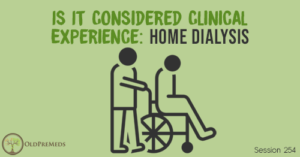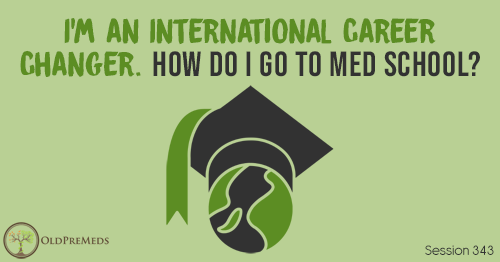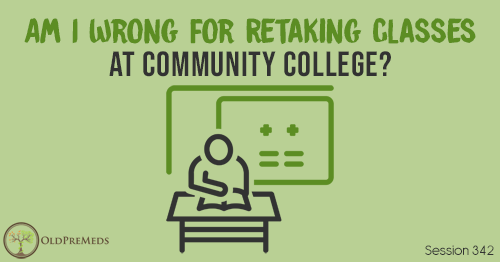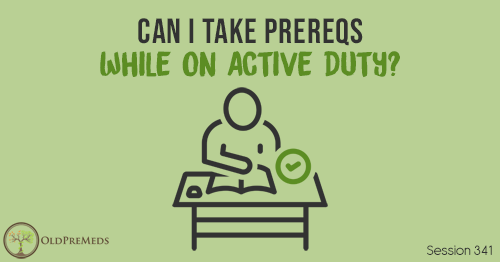Apple Podcasts | Google Podcasts
Session 254
Being a caregiver for a family member doesn’t always count as clinical experience, but in this case, it might. Find out why as we discuss at-home dialysis today.
Questions answered here on the podcast are taken directly from the Nontrad Premed Forum over at premedforums.com. Please go ahead and register for an account, ask your question, and have fun with the community.
Also, please be sure to check out all our other podcasts on Meded Media as we try to bring you as many resources as you need on this journey. To help you further on your journey to medical school, check out Mappd to get the guidance you need to get into medical school. Sign up for a free two-week trial.
Listen to this podcast episode with the player above, or keep reading for the highlights and takeaway points.
[02:51] OldPreMeds Question of the Week
“As part of my job of “being a good kid to sick parents,” I have to do some rather technical work in the administration of at-home hemodialysis for my father, who has CKD Stage 6.
I can plainly see run-of-the-mill caregiving isn’t clinical experience for the sake of medical school apps, but this job of mine left me scratching my head a little. What does everyone here think – clinical, or not so much?
Clinical aspects: had to be trained for about 2 months in proper technique in order to administer at-home HD, have to intervene in acute situations (such as BP drop-out, etc.), and am generally doing the work of a dialysis nurse. Wasn’t required to take on this job, but did so to help make my dad’s life a little easier (vs. “obligation”)
Non-clinical aspects: home setting, only one patient (my dad) – not exactly branching into the “caring for total strangers” category.”
[03:53] Caregiving as a Clinical Experience
This is a super common question from a caregiving standpoint. A lot of people assume if you are caregiving for a loved one, whether it’s a sick child, or a sick parent, or a sick spouse, that that doesn’t count as a clinical experience.
Now, AAMC actually has Caregiving listed as one of the five common clinical experiences or five uncommon ways to get clinical experience on their website.
Now, obviously, as a parent yourself, you are used to “taking care” of people. But if you have an ill child, a child with cancer, or a child born with any sort of differences, then taking care of that child could be thrown into the mix as a clinical experience.
If you’re in the hospital all the time with your child or parents or a loved one, those can be seen as clinical experiences. It’s not a common way to think about what we talk about all the time in terms of what is a clinical experience and what is not.
[05:46] What Makes a Clinical Experience
We often think of a clinical experience as in the field of phlebotomy, EMT, or being a scribe. You think of it as being in a workplace setting or a clinical setting a hospital setting. Or that you’re getting paid or volunteering your time to be around other patients and other providers.
'A lot of people don't translate clinical experience to being at home and taking care of a loved one, but it certainly counts.' Click To TweetHowever, a lot of students will take this one experience of taking care of their sick parent as the only experience they have. That’s where students will get into trouble is if this caregiving is the bulk or all of your clinical experience.
It’s different if the only experience you have is taking care of a loved one.
Taking care of someone else’s grandma Gertrude is completely different than taking care of your own grandma Gertrude. The communication is different, the stresses are different, and how they treat you is going to be different.
In this specific case, taking care of your father who’s going through hemodialysis is going to be completely different than being in a clinical setting or in a hospital setting and taking care of someone else.
[07:56]
Additionally, do not just lean on your clinical experiences to prove that you want to be a physician. As you’re going through this journey, make sure you’re getting the experiences that round out all of your experiences and exposures to medicine and to healthcare.
'Be able to put a picture together to show admissions committees that this is what you want to do.'Click To TweetBe able to succinctly and appropriately talk about why you want to be a physician in your personal statement. And if you don’t have the proper experiences, you will not be able to do that in your application. Those are the applications that usually don’t make any impact on an admissions committee.
So again, make sure you’re trying to get some other experiences as well.












